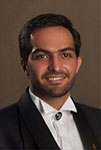Developing a reliable height function from the J-Leverett parameters to populate water saturation: a case study
Bert Filippi A , Bahman Joodi A and Mohammad Sarmadivaleh AOpes International
The APPEA Journal 55(1) 291-296 https://doi.org/10.1071/AJ14023
Published: 2015
Abstract
Populating water saturation is a critical step in dynamic modelling. This work introduces a different height function that equates directly with the Leverett-J formula. In doing so, the model initialises under quiescent conditions without the need for end-point scaling. The resulting water saturation is a function of permeability, porosity, clay volume and height above the free water level. The Vcl—or clay content—is an important feature in this formulation because it compensates between extreme values of permeability and porosity.
This peer-reviewed paper describes how a single height function was sufficient to match the log-derived water saturation for all wells in the Coracle sand of the Surprise Field in the North Sea. The process involved fitting a simple height formula, with the least possible parameters, to the J-function calculated from all the special core analysis (SCAL) data. These parameters were then tuned to match the log-derived water saturation.
This technique was subsequently used in other fields where a single height function, which honoured the measured capillary pressures, accurately matched water saturation in all of the wells.

Bert Filippi has a Bachelor of Engineering (Hon) degree, a Diploma of Reservoir Engineering (from Imperial College London), and a Master of Science (Petroleum Engineering) degree from the University of London. |

Bahman Joodi is a petroleum engineer with OPES International. He had worked for two years as a drilling engineer in various drilling rigs and is now involved in the reservoir studies of some of the major Australian oil and gas projects. Bahman received his Bachelor’s degree in reservoir engineering and Master’s degree in petroleum well engineering. |

Mohammad Sarmadivaleh has BSc, MEng and PhD degrees in petroleum engineering. He is a petroleum engineer at OPES International. He also worked at Curtin University’s Petroleum Engineering Department as an Associate Researcher for two years where he established the wettability laboratory and conducted laboratory research on CO2 sequestration. |


